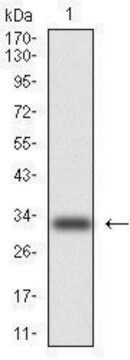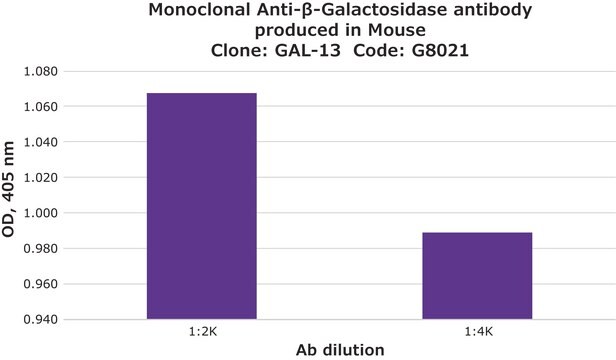V4630
Anti-Vimentin antibody produced in goat
whole antiserum
Synonym(s):
Anti-F5H288
About This Item
Recommended Products
biological source
goat
Quality Level
conjugate
unconjugated
antibody form
whole antiserum
antibody product type
primary antibodies
clone
polyclonal
mol wt
antigen 58 kDa
contains
15 mM sodium azide
species reactivity
wide range, human
technique(s)
immunohistochemistry (formalin-fixed, paraffin-embedded sections): suitable
immunohistochemistry (frozen sections): suitable
indirect immunofluorescence: 1:20 using formalin-fixed, paraffin-embedded sections of human tissue
western blot: 1:50 using HS-68 human foreskin cell extract
UniProt accession no.
shipped in
dry ice
storage temp.
−20°C
target post-translational modification
unmodified
Gene Information
human ... VIM(7431)
General description
Specificity
Immunogen
Application
- immunohistochemistry
- western blotting
- immunocytochemistry
- flow cytometry
Chromatin immunoprecipitation (1 paper)
Immunocytochemistry (1 paper)
Immunofluorescence (1 paper)
Immunohistochemistry (1 paper)
Biochem/physiol Actions
Disclaimer
Not finding the right product?
Try our Product Selector Tool.
recommended
Storage Class Code
13 - Non Combustible Solids
WGK
WGK 1
Flash Point(F)
Not applicable
Flash Point(C)
Not applicable
Personal Protective Equipment
Certificates of Analysis (COA)
Search for Certificates of Analysis (COA) by entering the products Lot/Batch Number. Lot and Batch Numbers can be found on a product’s label following the words ‘Lot’ or ‘Batch’.
Already Own This Product?
Find documentation for the products that you have recently purchased in the Document Library.
Customers Also Viewed
Our team of scientists has experience in all areas of research including Life Science, Material Science, Chemical Synthesis, Chromatography, Analytical and many others.
Contact Technical Service














